El Dorado: Quest for the City of Gold
Reading Time: 11 min
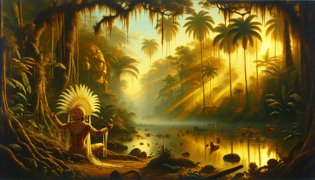
About Story: El Dorado: Quest for the City of Gold is a Legend from colombia set in the Ancient. This Poetic tale explores themes of Perseverance and is suitable for Adults. It offers Cultural insights. A perilous expedition through misty jungles and sacred rites in search of an elusive golden city.
Introduction
High in the folds of the Tenza Valley, where dawn mist clings to the moss‑drenched boughs like a bride’s veil, the tribe of Guatavita gathered on the stony shores of a sacred lagoon. Arawan, the young priest with eyes of burnt umber, knelt at water’s edge, his heart a drumbeat of ancestral memory. He pressed an obsidian blade to his palm and let four rivulets of blood escape, each drop rippling like coiled serpents across the glassy water. The air brimmed with the scent of damp earth and wet orchid, a heady perfume that mixed with the distant hum of cicadas, punctuating every whispered prayer.
As the sun rose, its golden fingers brushed the lagoon’s surface, igniting the sacred waters in a blaze of molten fire. Arawan bowed his head and uttered the ancient invocation, his voice trembling like woven reeds in a storm. Elders watched in respectful hush. No one spoke aloud—each soul felt the weight of legend pressing against the dawn. A faint copper shimmer stirred at the heart of the pool, and for a breath, the world held its own shadow.
Rumour had flown beyond the emerald hills, carried on the wind like a secret too bright for mortal eyes. Spaniards in gleaming armour whispered of cities paved with gold, of human offerings thrown into watery graves. They said it was a madman’s promise or a gift from gods grown indifferent. And yet, every seasoned conquistador from Santa Fé de Bogotá wondered if such a festival of riches might truly exist. ¿Qué más pues, they muttered between sips of tequila in jest, yet none could forget the lure of sunlit treasure veiled beneath the jungle’s emerald cloak. In that hush of morning light, two worlds—like opposing wings of a bird—prepared to converge upon destiny.
Ritual by the Sacred Lake
At first light Arawan returned to the lagoon, every footstep a hymn upon wet stone. The morning air carried the musk of damp ferns, and each breath tasted of ancient promise. He wore a mantle woven from jaguar fur, its black rosettes shining like midnight pools. Elders formed a crescent around him, torches guttering against a chill that clung to their bones. One by one they deposited precious offerings—emerald beads, carved shells and feathers that once crowned sky‑soaring harpy eagles. Arawan cradled these tokens in trembling hands, then placed them where the water licked the rim of the shore.
A hush fell as the priest raised his obsidian blade to the horizon. He spoke low words taught by his grandmother, a litany older than memory. His voice rose and fell like a distant tide, each phrase a winding chord that bound him closer to earth’s heartbeat. Behind him, the forest yielded a symphony of sounds: a toucan’s harsh cry, the rustle of liana vines stirred by unseen creatures, and beneath it all, the slow drum of water insects skimming the lagoon like tiny umbrellas.
When Arawan finally let the blade touch his skin, a hush descended that felt nearly holy. His blood ran slow and bright, winding between his fingers before it touched the water’s surface. There, it sparked as if ignited by hidden coals. The lagoon’s colour shifted from jade to burnished bronze. Ripples spread and pooled at the centre, revealing a faint shimmer of gilded light. For a heartbeat he beheld the silhouette of a golden city—a place of soaring towers swathed in mist, where the air itself seemed distilled into precious metal.
The vision vanished like smoke on the breeze, leaving nothing but the scent of wet orchid and damp moss. Arawan staggered back, breath coming in ragged gasps. The elders knelt and murmured blessings. Some wept, others bowed their heads. The promise of El Dorado had returned once more to the world of men, but its gate lay hidden far beyond these brambled banks. It was then that word reached the Spanish garrison downstream, carried on the breath of a young runner who gasped the name of the golden city like a prayer. And thus, the wheels of fate—rusted by blood and hope—began to turn anew.
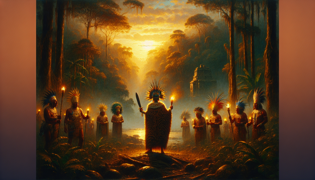
Spaniards on the Trail
Captain Diego Molina stood atop a ridge overlooking the winding Magdalena River, the world painted in emerald and bronze. His breastplate dented from skirmishes flashed like a broken mirror in the weak sunlight. He recalled tales of a city dripping in gold, its very stones melted from the tears of gods. Under his heel, the earth felt soft as curd—humid, welcoming yet treacherous. He lit a short clay pipe and drew a silk thread of smoke up into the palms of his gloves.
His lieutenant, Rodrigo, grimaced against the scent of burning tobacco, unaccustomed to its acrid bite. They conversed in hushed tones, their voices carrying an edge sharpened by fatigue and hope. Rodrigo spat to the side and muttered that rumours were but folly—yet none dared voice it twice. For every man of iron resolve knew that gold could corrupt a soul faster than malaria could wither the body. The forest behind them echoed with the call of howler monkeys, a sombre chorus that set their nerves jangling like loose chains.
In the camp below, the men gathered around a chipped cauldron of bitter stew, its clouded surface reflecting the flicker of lantern light. One veteran muttered a local saying he’d heard in Santa Fé—pues, oro no da consuelo when lives are spent chasing shadows. Amid their tattered blankets and bulging packs, each conquistador nursed his own brand of longing: for titles, for fortune, or for the simple peace of returning home. Yet they marched on, following a ragged map inked by greed and guided by Arawan’s vision, now known to them via captive informants.
That night, lightning flickered on distant peaks like silent watch‑fires. The torrential rain pattered on leather hats, mingling with the drum of restless moustiques. Captain Molina clapped Rodrigo on the shoulder and vowed that come dawn, they would cross into uncharted valley. There, the promise of El Dorado would await—or the promise of death. The wind rose, carrying with it the scent of wet vines and the faint echo of tribal drums from some hidden glade. In that moment, hope and fear danced together like twin serpents coiling around a single branch.
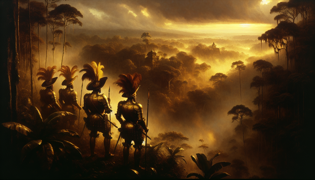
Through the Emerald Labyrinth
The jungle swallowed them whole, an emerald labyrinth of twisting vines and treacherous vines. Each footstep sank into loamy earth as though the forest itself sought to trap them. Sunlight struggled through the thick canopy, dappling the ground in flickers of gold and green. Rivers of leaves rustled overhead, the winged orchestra of toucans and macaws calling across shadowed corridors. The air was thick with the tang of decaying wood and unspoken secrets. Every man’s breath came in ragged gasps, sweat beading along tawny faces.
Arawan served as their reluctant guide, his eyes wet with a mixture of dread and determination. He muttered prayers between parched lips, calling upon ancestors whose voices echoed like drifting mist. Yet even he recoiled when a jaguar’s roar rippled through the foliage, sounding like a thunderclap in a chapel. At night they huddled beneath dripping thatch, listening to the susurrus of frogs and the snap of unseen twigs as creatures stalked just beyond campfire glow. Rodrigo studied the priest’s profile by firelight, noting how fear and faith warred in his dark gaze.
When food ran scarce, they scavenged for yuca roots among gnarly roots that clawed at their boots. Each meal tasted bitter, yet none spoke of hunger. Their hunger was for gold, a hunger that burned like acid in their veins. At dawn on the fifth day, Arawan halted by a moss‑cloaked ruin, its crumbling stones carved with serpents and sun discs. The sight stole Rodrigo’s breath—enough evidence of a civilisation steeped in ritual, enough to fuel Molina’s hope anew.
But the jungle had more trials in store. A swollen river barred their path, its currents foaming like melted butter. Men sank knee‑deep in silt, boots lost to greedy muck. The howls of distant jaguars pressed them onward, reminding them that El Dorado would not be won by steel alone. In those days, forging ahead felt like pressing a thorn through one’s own hand—painful yet necessary if they hoped to glimpse even a shard of the city’s fabled splendour.
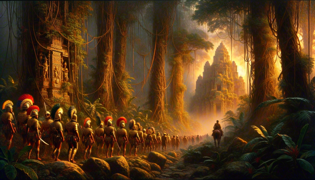
Revelation in the Golden Mists
At last they crested a ridge into a hidden valley, and there it lay: an abandoned city gleaming like a bruise of molten light against the emerald walls. Towers of limestone carved with solar motifs stood half‑submerged in creeping vines. Cobblestone plazas cracked open, allowing orchids to erupt like fires in every crevice. The sunlight caught gilded surfaces—doorframes, altars, stepped pyramids—casting a glow that seemed almost alive. The air was heady with the scent of jasmines and ancient incense.
Captain Molina dismounted, his steel greaves glinting in the morning haze. He approached an altar encrusted with flakes of gold, each one as thin as a dragonfly’s wing. Arawan followed more slowly, reverence slowing his gait. He placed his hand upon the altar, feeling a pulse like a heartbeat echoing beneath centuries of dust. He whispered an old vow, asking the gods to spare the city’s soul from conquest.
Rodrigo knelt on cracked paving stones and examined a broken idol of the sun god. It reminded him that gold alone could not buy honour. The conquistadors scattered, touching walls that felt warm as captured sunlight, marveling at reliefs of feathered serpents that seemed almost animate in the still air. But as they gathered treasure—pouches of gold dust, ceremonial masks, and solid bars—they sensed the valley shift underfoot. A low rumble rose from the earth, stirring leaves into frantic dance.
Arawan raised his arms, chanting words older than memory. The valley answered with a thunderous roar. Stones trembled and birds fled in confused flocks. With a final crack, a hidden fissure split the plaza floor. The earth yawned, swallowing half the treasure and a column of stone with it. Men cried out and scrambled back as the ground settled again. In that moment, Molina realised that the city’s wealth was also its curse—an ember of greed that could never be claimed without consequence.
They gathered what gold they could carry, but left behind more than they took. As they descended the ridge toward the waiting convoy, the valley receded behind a curtain of mist, as if ashamed to reveal its full splendour to mortal eyes. The jungle reclaimed what it wished, swallowing relics and legends together in emerald embrace. And Arawan, walking between conquistador and forest, carried a secret more precious than any metal: the knowledge that some treasures are meant only for memory.
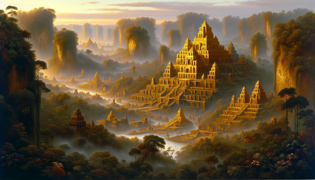
Conclusion
Their return voyage was a study in hushed triumph and quiet reflection. Captain Molina rode at the front, his pack heavy with gold dust—but his eyes were drawn again and again to Arawan’s still figure. The priest walked with measured steps, carrying a single gold plaque carved with sun discs, and nothing more. The men murmured among themselves that the city had judged them worthy of but a fraction of its bounty. The jungle gave and the jungle took away, as fickle as fortune itself.
When they reached Santa Fé de Bogotá, the clatter of hooves and shining brigades startled the townfolk awake. Word spread like wildfire. Merchants polished scales in frantic hopes of weighing all that gold. Yet in the silent corridors of power, wiser souls spoke in sombre tones: gold could gild a city, but it could not buy honour or peace of mind. Some muttered that El Dorado best remained a myth, for mortal hands were too clumsy to cradle such wonder without perishing.
Arawan withdrew to his mountain village, where he restored the plaque atop the sacred altar. Elders wept and laughed in the same breath. They fed him panela and cocoa, praising his courage and chastising his trust of foreign steel. He merely bowed and said that the true city of gold lived in every act of faith and sacrifice.
Captain Molina received honours befitting a hero, yet each night he dreamt of rattling stones and the roar of the earth. He gave most of his prize to the Crown, retaining only enough to settle his debts. In quiet moments, he would finger the gold plaque, feeling its warmth as though it still pulsed with life.
And so the legend endured: El Dorado, the city of gold born of indigenous rite and colonial ambition, remained both beacon and warning. Some say its gates rise again in memory, waiting for pilgrim and prince alike to discover that the richest treasure is the story we carry onward, heart to heart.

















